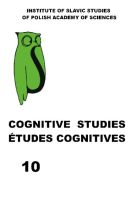Form, Its Meaning, and Dictionary Entries
Form, Its Meaning, and Dictionary Entries
Author(s): Violetta Koseska-ToszewaSubject(s): Language and Literature Studies
Published by: Instytut Slawistyki Polskiej Akademii Nauk
Keywords: Language form; meaning of a form aspect and tense; semantic category of definiteness/indefiniteness; contrastive studies; semantic interlanguage; terminological dictionary; contrastive description leading from meaning to form.
Summary/Abstract: As we know, a language form is a unit which plays a specific form in the language, e.g. a semantic or syntactical one. We establish the function of a form based on its use (occurrence), i.e. its relation with the meanings of other forms in speech or in a text. The meaning of a form is the value of its function. In the traditional grammar, form is opposed to its meaning. However, various grammar schools have big problems with distinguishing between a form and its function. For example, the present tense form has a number of basic temporal meanings in Bulgarian as well as in Polish and Russian, and in none of those languages this is only the present time, (see past, future and habituality expressed using the present tense form). It is a big mistake not to distinguish between the meanings of article in article languages. For example, in Bulgarian the same form of article can express both uniqueness and universality (or, respectively: definiteness and indefiniteness). In the quoted book (Koseska-Toszewa, 1982), I put forward a hypothesis on the development of the meaning of Bulgarian article. In my opinion, initially the article expressed uniqueness of an element (object), and then started to express also uniqueness of a set, which later, due to equalling two completely different semantically-logical structures, i.e. structures with universal and unique quantification, lead to a homonymy and to the article expressing also universality, i.e. indefiniteness. Similarly in English, French, Rumanian or Albanian, where the same form of article can express either uniqueness or universality This proves that the above homonymy is of a general rather than typological (e.g. Balkan) character. Naturally, in the above languages the definite article form can also express uniqueness of an object or a set, so it also expresses definiteness. Ambiguity of the definite article form is a phenomenon exceeding the area of Balkan languages, and the only Balkanism is the position of the article - speaking more precisely, its postpositiveness (postpositive position). However, that position gives us no right to treat it differently than the English or French article. In Bulgarian, Rumanian and Albanian the postpositive article is written together with the name its concerns, but it is neither a unit belonging to the root of the word nor the ending of the word. The above observations, based first of all on the semantically-logical aspects of the definiteness category, have been confirmed by the language material from the Suprasl Code, where Bulgarian article does not occur in universally quantified nominal structures, but in uniquely quantified nominal expressions, denoting satisfaction of the predicate either by one element of the sentence or by the whole set treated as the only one. It is worth stressing that distinguishing between the form and its meaning in comparing the material 6 languages belonging to three different groups of Slavic languages (as is the case in the.
Journal: Cognitive Studies | Études cognitives
- Issue Year: 2010
- Issue No: 10
- Page Range: 133-143
- Page Count: 11
- Language: English

